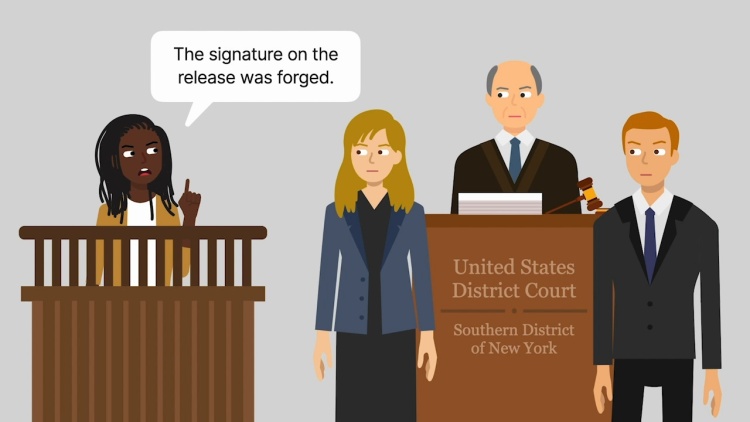Almeciga v. Center for Investigative Reporting, Inc.
United States District Court for the Southern District of New York
185 F. Supp. 3d 401 (2016)
- Written by Rose VanHofwegen, JD
Facts
Erica Almeciga (plaintiff) sued the Center for Investigative Reporting, Inc. (CIR) (defendant), for breaching a promise to protect her identity when it made a video about her drug-cartel boyfriend. CIR produced a release that she purportedly signed. Almeciga claimed her signature was forged and produced handwriting expert Wendy Carlson in support. Carlson compared the signature on the release to samples of a signature that Almeciga’s attorney gave her and concluded the signature was forged. However, Carlson admitted she had no knowledge whether the samples were actually Almeciga’s, so the court had Almeciga write her signature 10 times in open court, which she did very slowly. Carlson prepared a second report that opined that the release signature was forged based on comparison to the in-court signatures. CIR asked the court to exclude the report, arguing it did not satisfy the criteria for scientific evidence. The court conducted a hearing to determine whether handwriting analysis meets the Daubert criteria. Carlson testified that she used the “ACE-V” method to analyze the signatures, meaning “Analyze, Compare, Evaluate, and Verify.” She compared certain letters’ shape, slant, strokes, and angles, which she described as using experience knowing what to look for, rather than a science like chemistry or biology.
Rule of Law
Issue
Holding and Reasoning (Rakoff, J.)
What to do next…
Here's why 907,000 law students have relied on our case briefs:
- Written by law professors and practitioners, not other law students. 47,100 briefs, keyed to 996 casebooks. Top-notch customer support.
- The right amount of information, includes the facts, issues, rule of law, holding and reasoning, and any concurrences and dissents.
- Access in your classes, works on your mobile and tablet. Massive library of related video lessons and high quality multiple-choice questions.
- Easy to use, uniform format for every case brief. Written in plain English, not in legalese. Our briefs summarize and simplify; they don’t just repeat the court’s language.





